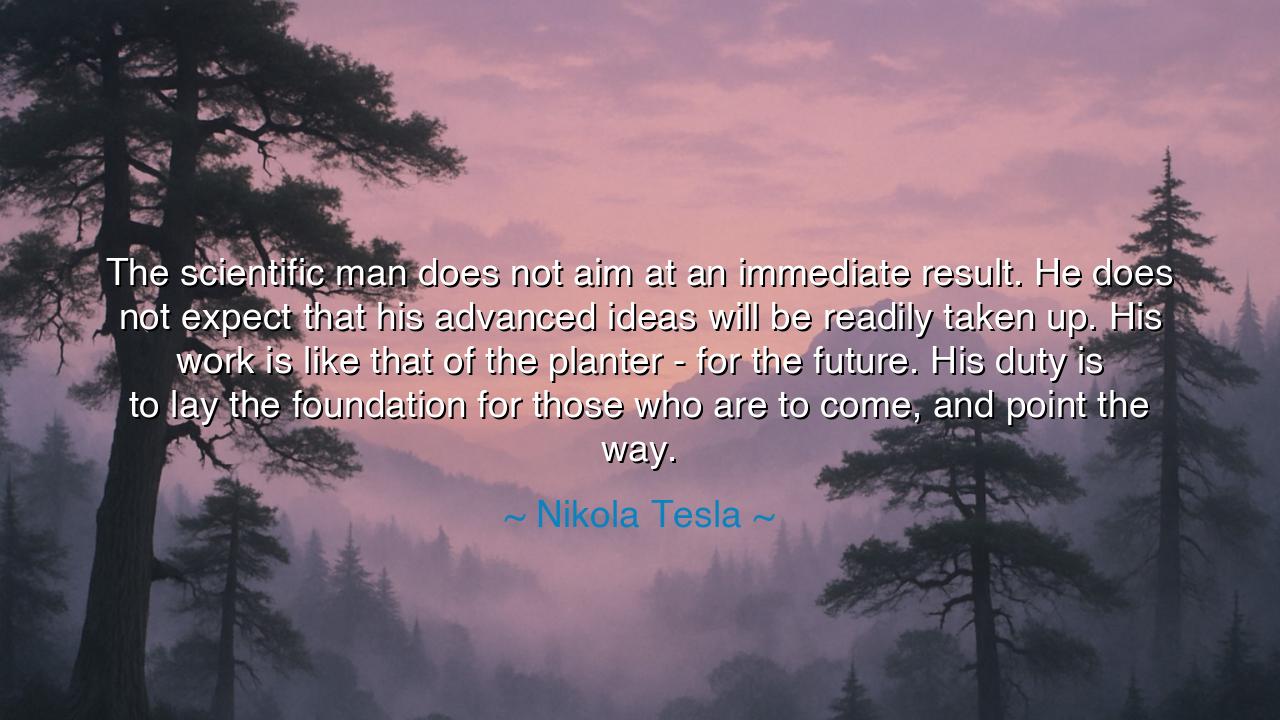
The scientific man does not aim at an immediate result. He does
The scientific man does not aim at an immediate result. He does not expect that his advanced ideas will be readily taken up. His work is like that of the planter - for the future. His duty is to lay the foundation for those who are to come, and point the way.






In the world of science and discovery, there exists a quiet and often misunderstood truth: that true progress is rarely immediate and is, more often than not, built on the backs of those who came before. Nikola Tesla’s words, "The scientific man does not aim at an immediate result. He does not expect that his advanced ideas will be readily taken up. His work is like that of the planter - for the future. His duty is to lay the foundation for those who are to come, and point the way," resonate deeply with the timeless journey of innovation and discovery. Tesla's insight highlights the patience required for those who strive to bring change, not for their own benefit, but for the betterment of generations yet unborn.
In the ancient world, the pursuit of knowledge and wisdom was often a slow and deliberate process. The philosophers of ancient Greece, such as Socrates and Plato, were not concerned with instant fame or immediate understanding. Instead, they planted seeds of thought and reflection, understanding that their ideas would one day bear fruit for future generations. Plato, in his writings, spoke of philosophy as a process of unveiling truth, one layer at a time, with each philosopher standing on the shoulders of those who came before. In this sense, Tesla’s vision echoes the ancient wisdom: the true value of a scientist’s work lies not in quick recognition, but in the lasting impact it will have on those who continue the journey long after they have gone.
Consider the example of Archimedes, the great mathematician and inventor of ancient Greece. His most famous principle, the law of buoyancy, was not immediately embraced, nor did it change the world overnight. Archimedes' work, much like Tesla’s, laid the foundation for scientific progress that would not be fully realized until centuries later. The great scientific advancements that followed—such as those made by Isaac Newton and Albert Einstein—were built upon the intellectual groundwork laid by Archimedes. His insight into the natural world, although slow to be recognized, was like the planting of a tree whose branches would reach far into the future. In this way, Tesla’s analogy of the scientist as a planter rings true—greatness is cultivated over time, often in ways unseen by those who first sow the seeds.
In a more recent example, the work of Albert Einstein offers a striking parallel to Tesla’s thoughts. When Einstein published his theory of relativity, the world did not immediately embrace his ideas. His theories were met with skepticism, and many scientists of the time failed to understand or accept the revolutionary ideas he presented. Yet, Einstein, like Tesla, understood that truth often takes time to be fully appreciated. His work was not about seeking immediate acclaim but about planting the seeds of a new understanding of the universe. Over time, Einstein’s ideas revolutionized physics and reshaped our conception of space, time, and gravity, illustrating how the scientific man’s true duty is to point the way for those who come after.
The lesson embedded in Tesla’s words is one of profound wisdom and selflessness. To be a scientist, or any kind of pioneer, is to accept that one may not see the full fruits of their labor in their own lifetime. Patience and foresight are key virtues in this path. Tesla understood that his inventions, many of which were groundbreaking, would not immediately revolutionize the world in the way he envisioned. Yet he chose to devote his life to laying down the foundations for future generations to build upon. In this way, he is a model for us all—not in the pursuit of personal glory, but in the commitment to something greater than ourselves, something that will endure and benefit others long after we have gone.
In our own lives, we are all called to be planters in some way. Whether in our work, our relationships, or our communities, we must recognize that the true value of our actions is often not realized immediately. Just as Tesla and Einstein laid the groundwork for breakthroughs that came after them, we, too, must be willing to invest in long-term efforts, understanding that progress is rarely instantaneous. Every step we take toward something better, every small act of service, every effort to improve our skills or knowledge, adds to the foundation upon which the future will be built.
Thus, let us embrace the slow, steady work of planting for the future. Let us have the courage to commit ourselves to long-term endeavors, understanding that immediate results are often the enemy of true progress. Whether we are scientists, artists, leaders, or students, we must honor the work that builds the future, even if we never see the full fruition of our efforts. In the quiet and unsung moments of creation, we lay the path for those who will come after us. In doing so, we will contribute not only to our own lives but to the legacy of all humanity.






AAdministratorAdministrator
Welcome, honored guests. Please leave a comment, we will respond soon